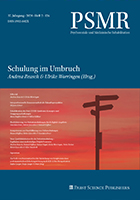Tax compliance depends on the factors trust in authorities and perceived power of authorities. But trust on the one hand fosters voluntary compliance, whereas power on the other hand leads to enforced compliance, Chistoph Kogler, Erich Kirchler, Larissa Batrancea, and Anca Nichita (University Vienna) report (in Abstracts of the 55th Conference of Experimental Psychologists, 2013).
The scientists tested these main assumptions of the slippery slope framework by manipulating trust and power via different scenarios in more than 30 countries on five continents. As predicted, the highest levels of compliance were found in conditions where trust and power were high.
In addition, participants in conditions of high trust indicated more voluntary compliance, just as participants in conditions of high power reported more enforced compliance. Furthermore, indices of perceptions of actual levels of trust and power for all countries were calculated and compared to data on shadow economy and corruption from other sources. Overall, the present results support the assumptions of the slippery slope framework and confirm the importance of trust and power as determinants of tax compliance.
Katharina Gangl et al. (University Vienna) investigated the impact of communication and motivation strategies on tax compliance:
Tax authorities can communicate tax issues either to individual taxpayers or to taxpayers in general via mass communication. They can also motivate taxpayers to comply either by exerting coercive power or legitimate power. The aim of the experimental study is to analyze the effects of different communication and motivation strategies on tax compliance.
In a two by two scenario based experiment, about 160 participants imagined to get a personalized letter or a brochure addressed to the public in general containing information about coercive or legitimate strategies of tax authorities to ensure tax honesty.
Results show an interaction effect between individual and mass communication and power: Legitimate power leads to higher intended tax compliance than coercive power in the personalized communication condition.
Results also indicate that mass communication strengthens social norms to comply. In comparison to coercive power, legitimate power seems to increase trust in tax authorities, to lead to perceptions of low antagonistic and high synergistic tax climate, to less enforced compliance, and more voluntary cooperation.
It is advisable to personalize communication about legitimate power to increase tax compliance and positive attitudes towards the tax system, Katharina Gangl, Eva Hofmann, and Erich Kirchler conclude in:
TeaP 2013 - Abstracts of the 55th Conference of Experimental Psychologists, edited by U. Ansorge, E. Kirchler, C. Lamm, H. Leder. Pabst, 472 pages, ISBN 978-3-89967-852-9






















